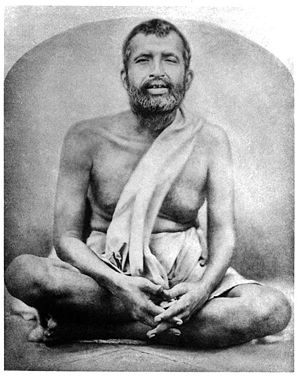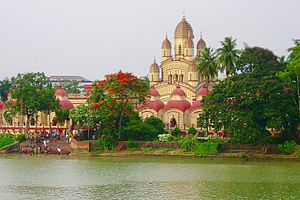Kalpataru Day
Kalpataru Day also called Kalpataru Diwas or Kalpataru Utsav is an annual religious festival observed by monks of the Ramakrishna Math monastic order of Hinduism and lay followers of the associated Ramakrishna Mission, as well as the worldwide Vedanta Societies. These organizations follow the teachings of Ramakrishna, the 19th century Indian mystic and figure in the Hindu Renaissance.
The event commemorates the day on January 1, 1886, when his followers believe that Ramakrishna revealed himself to be an Avatar, or God incarnate on earth. It is held each January 1. Although the observances are held in many locations, the most significant celebration takes place at Cossipore Garden House or Udyanbati near Kolkata (then called Calcutta), present Ramakrishna Math, a branch of Ramakrishna Order, the place where Ramakrishna spent last days of his life. It is classified as one of the "Lord's special festivals" by followers of Ramakrishna.[1]
In India on January 1, 2010, as in other years, "Devotees from all over the country thronged the famed Kali Temple at Dakshineshwar for Kalpataru Utsav, which is celebrated on this day every year." [2] India's Eastern Railway scheduled two special trains on January 1, 2010, to carry the crowds to Kali Temple.[3] The event includes providing medical care, blankets and clothing to the poor.
Origins
The first Kalpataru Day, January 1, 1886, was "an event of unusual consequence and meaning" in the life of Ramakrishna and his followers.[4] Ramakrishna was suffering from throat cancer at that time, and his health was declining. He and his closest followers had moved to a garden house in the northern Calcutta neighbourhood of Cossipore. January 1 was a relatively good day for him, and he took a walk in the garden. There, he asked one of his followers, Girish, a question he had often asked before, "Who do you say that I am?" [4] Girish responded that he believed that Ramakrishna was "God incarnate, come to Earth out of mercy for humankind".[4] Ramakrishna replied, "What more shall I say? May you be awakened."[4] Ramakrishna then entered an "ecstatic state" and began touching all of his followers. Those he touched reported experiencing a variety of new states of consciousness, including vivid visions. For one, Vaikuntha, the visions persisted and interfered with daily life, so that he feared that he might be going insane.
One disciple, Ramachandra Dutta, explained that Ramakrishna had, in effect become Kalpataru (also called Kalpavriksha), the "wish-fulfilling tree" of Sanskrit literature and Hindu mythology.[4] Dutta named the commemoration of this mystical event "Kalpataru Day" as a result.[5] This event "carried meanings and memories of cosmic import for the disciples"[4] and also prepared them for Ramakrishna's death",[4] which occurred only a few months later, on August 16, 1886.
It is interesting to note that none of Ramakrishna's monastic disciples were present during this event. Most having spent the night in meditation and keeping watch over the ailing Ramakrishna were taking rest, while others took the opportunity to clean Ramakrishna's room, bedding, etc. One of these disciples was Saratchandra Chakravarty, later known as Swami Saradananda. Having witnessed the day's event from the rooftop of Ramakrishna's residence, Saradananda later commented that "Kalpataru Day" is a misnomer, since the mythological wish-fulfilling tree (Kalpataru) grants anything, good or bad, and Ramakrishna gave only what was spiritually beneficial [1]. Saradananda rather referred to the event as "the bestowal of freedom from fear on all devotees by revealing himself" (ātmaprakāśe abhayapradāna) (p. 1024).
References
- ↑ Lua error in package.lua at line 80: module 'strict' not found.
- ↑ Lua error in package.lua at line 80: module 'strict' not found.
- ↑ Lua error in package.lua at line 80: module 'strict' not found.
- ↑ 4.0 4.1 4.2 4.3 4.4 4.5 4.6 Lua error in package.lua at line 80: module 'strict' not found.
- ↑ Lua error in package.lua at line 80: module 'strict' not found.


